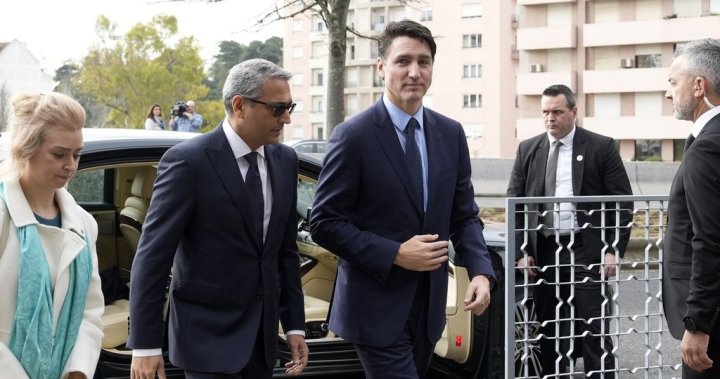Canada
Trudeau says powering AI without compromising climate change is a G7 priority

G7 Prioritizes Clean Energy for AI Growth Under Canada’s Leadership
Prime Minister Justin Trudeau has unveiled a key priority for the G7 this year: developing more clean electricity to power artificial intelligence (AI) technologies. As Canada assumes the presidency of the G7, Trudeau emphasized that this initiative must not compromise efforts to address climate change. Speaking at a roundtable discussion that included Canadian and French officials, as well as representatives from tech giants like Amazon, Dell, and IBM, Trudeau underscored the importance of providing innovators with access to reliable and clean energy to fuel AI advancements. He specifically highlighted nuclear energy as a critical part of the solution, noting that it aligns with both energy security and environmental goals.
Trudeau also stressed the need to reduce the energy demand of AI systems, which currently require significant computational power and electricity. He called for investing in infrastructure that can support the rapid development of AI while ensuring sustainability. This dual focus on energy generation and efficiency reflects Canada’s commitment to balancing technological progress with environmental responsibility.
Canada’s Leadership in AI Governance
Canada has long been a leader in shaping AI governance frameworks, a position Trudeau aims to reinforce during his presidency of the G7. In 2017, Canada played a pivotal role in the Montreal Declaration on Responsible AI, which established ethical guidelines for the development and use of AI technologies. More recently, in 2020, Canada and France jointly launched the Global Partnership on Artificial Intelligence (GPAI), an international collaboration aimed at ensuring AI systems are human-centered and trustworthy. The partnership has since been integrated into the OECD, further amplifying its global reach.
Trudeau is set to speak at the closing ceremony of an informal ministerial meeting related to GPAI, where he will highlight Canada’s ongoing contributions to AI governance. These efforts precede the recent wave of generative AI technologies, such as ChatGPT, which have brought AI safety and regulation to the forefront of global discussions.
The AI Action Summit in Paris: A Platform for Global Collaboration
Following the roundtable, Trudeau attended the AI Action Summit in Paris, a two-day event co-chaired by Indian Prime Minister Narendra Modi and French President Emmanuel Macron. The summit brought together nearly 100 heads of state and government, along with approximately 1,000 civil society stakeholders from around 100 countries. This broader focus of the Paris meeting includes key themes such as AI’s impact on the public interest, the future of work, innovation, and culture.
Experts view the summit as an opportunity for Trudeau to demonstrate Canada’s commitment to AI and its role on the global stage. Rowan Wilkinson, a research analyst at Chatham House, noted that Trudeau’s participation aligns with Canada’s strategic interests and highlights the country’s academic excellence in AI research. However, critics have pointed out that while Canada excels in research, it has been slower to commercialize AI technologies. Additionally, the Liberal government’s AI regulation bill has faced delays in Parliament, potentially jeopardizing its passage ahead of the upcoming spring election.
Addressing AI Risks and Challenges
The Paris summit builds on previous international efforts to address AI safety and risks. In 2023, world leaders met at Bletchley Park in the UK, where they issued a joint statement on AI safety. This was followed by a second meeting in Seoul, South Korea, in 2024, where leaders agreed to establish a network of publicly backed safety institutes to advance AI research and testing. Canada has since launched the Canadian Artificial Intelligence Safety Institute, which will focus on issues such as bias, system robustness, and privacy breaches.
Yoshua Bengio, a leading Canadian AI researcher, was tasked with leading an international report on AI safety, incorporating insights from 96 global experts. The report highlights both the potential benefits and risks of general-purpose AI, including concerns about scams, privacy violations, and large-scale labor market disruptions. Nicolas Papernot, co-director of the Canadian institute’s research program, emphasized the importance of collaboration with international partners to address these challenges.
Conclusion: Canada’s Role in Shaping the Future of AI
As the G7 presidency and the AI Action Summit demonstrate, Canada is playing a significant role in shaping the global agenda for AI. Trudeau’s emphasis on clean energy and nuclear technologies underscores the country’s commitment to sustainability and innovation. However, challenges remain, particularly in commercializing AI technologies and advancing regulatory frameworks.
Experts like Florian Martin-Bariteau and Rowan Wilkinson agree that Canada’s strengths in AI research and governance position it as a key player in this transformative era. The joint statements and international collaborations emerging from summits like the one in Paris will likely shape national policies and global standards for AI safety and development. As the world navigates the rapid evolution of AI, Canada’s leadership and expertise will be crucial in ensuring that this technology benefits humanity while minimizing its risks.











